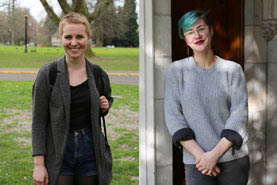
IRIS login | Reed College home Volume 96, No. 2: June 2017
Tags
"radio"
Student wins Watson to report on Soviet ruins

History/lit major Sasha Peters ’15 won a Watson Fellowship to explore ruins in the former Soviet sphere. Photo by Chris Lydgate
History/literature major Sasha Peters ’15 won a Thomas J. Watson Fellowship to explore abandoned sites and cities in the Soviet sphere through the medium of radio.
Sasha's project is titled Radio in the Ruins and will take her to Latvia, Czech Republic, Poland, Norway, Bulgaria, and Germany. "The Soviet Union and its influence produced an impressive array of buildings, monuments, and sites that embodied communist ideology," her proposal states. "After the Soviet Union’s fall, many of these places became inessential or unsupportable and were abandoned. Some of those places, decaying as they are, remain today. For my Watson year, I will travel to ruins in the Soviet sphere and make radio pieces about each of them. I aim to encapsulate the rich histories and eerie beauty of these ruins with sound."
Her friend Rennie Meyers ’15 also won a Watson Fellowship.
Continue reading Student wins Watson to report on Soviet ruins
Two Reedies Win Watsons

Reed students Sasha Peters and Rennie Meyers won Watson Fellowships to pursue a year of independent study after graduation. Photos by Chris Lydgate
We're thrilled to announce that two Reed seniors have won Thomas J. Watson Fellowships for purposeful, independent study outside the United States.
Environmental studies-history major Rennie Meyers ’15 won a fellowship to study the formation of artificial coral reefs and history/literature major Sasha Peters ’15 won a fellowship to explore abandoned sites and cities in the Soviet sphere through the medium of radio.
Coral Reefs
Continue reading Two Reedies Win Watsons
KRRC Forsakes Terrestrial Broadcast
Two semesters ago, I was DJ at KRRC. Broadcast on Friday afternoons, "Get Naked Radio"--a showcase of electronic dance music that my friends and I put together every week--was slotted between several hours of dead air. This came as a bit of a surprise to us, as we initially believed Friday afternoons, sandwiched between my last class in Eliot Hall and dinner at Commons--was "prime time" for KRRC. Right.
As the semester unfolded, we began to grasp the hard truth that no one was listening. Even on days when the transmitter was functioning properly, our broadcasting radius barely extended beyond the library. And those who would hypothetically listen to Get Naked Radio--our friends--were usually sitting on the beat-up couches strewn across the radio station.
So I was sad but hardly surprised when KRRC terminated its 100-watt terrestrial broadcast last year. In fact, November 30, 2011 marked the last day that KRRC broadcast on the FM dial. Reed has since donated its FM license to the non-profit grassroots group Common Frequency.The move came at the heels of a year-long saga that ultimately ended in KRRC losing its frequency (97.9) to KRNQ, a commercial alternative rock station owned by Cumulus Media. This was the third time KRRC had been bumped from its frequency by a commercial station. (For context: commercial stations can essentially "overtake" KRRC's frequency because of their high power broadcasting license. KRRC's broadcasting license, a secondary-service license phased out by the FCC in 1978, only allows for a broadcast radius the size of campus, if not smaller.)
Continue reading KRRC Forsakes Terrestrial Broadcast

